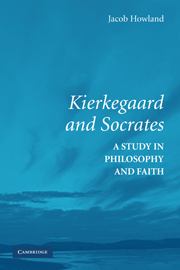Book contents
- Frontmatter
- Contents
- Note on Texts and Translations
- Acknowledgments
- Kierkegaard and Socrates
- Introduction
- 1 Johannes Climacus, Socratic Philosopher
- 2 Climacus's Thought-Project
- 3 Platonic Interlude: Eros and the God
- 4 Climacus's Poetical Venture
- 5 The Paradox and the Passion of Thought
- 6 Self-Love and Offense
- 7 Faith and the Contemporary Follower
- 8 Climacan Interlude: On Historical Necessity
- 9 The Follower at Second Hand and The Moral
- 10 Socrates in Postscript
- Epilogue: Kierkegaard on Christ and Socrates
- Works Cited
- Index
Introduction
Published online by Cambridge University Press: 01 December 2009
- Frontmatter
- Contents
- Note on Texts and Translations
- Acknowledgments
- Kierkegaard and Socrates
- Introduction
- 1 Johannes Climacus, Socratic Philosopher
- 2 Climacus's Thought-Project
- 3 Platonic Interlude: Eros and the God
- 4 Climacus's Poetical Venture
- 5 The Paradox and the Passion of Thought
- 6 Self-Love and Offense
- 7 Faith and the Contemporary Follower
- 8 Climacan Interlude: On Historical Necessity
- 9 The Follower at Second Hand and The Moral
- 10 Socrates in Postscript
- Epilogue: Kierkegaard on Christ and Socrates
- Works Cited
- Index
Summary
During an idle moment in my office at the university, now well over ten years ago, I selected from my bookcase a thin blue hardcover volume that I had never before opened. The book was Philosophical Fragments by Johannes Climacus, translated into English by David F. Swenson, and published in 1944 for the American-Scandinavian Foundation by Princeton University Press. Of Climacus, I knew only that he was one of a handful of authorial personae under whose names Søren Kierkegaard published such pseudonymous works as Either/Or, Fear and Trembling, and Stages on Life's Way. Of Kierkegaard, I knew only what little I could remember from a brief encounter in an undergraduate survey course. But Climacus obviously had something to say to me. He talked about the absolute importance of the truth in human life, and he wasted no words in doing so. His insights into the essential nature of Socratic teaching and learning were especially striking. His understanding of Socrates, I thought, was rivaled only by Plato and Xenophon, two authors who had long stood at the center of my philosophical interests. Yet as far as I could tell, the real subject of his book was not Socrates, and not even philosophy. It was religious faith.
There was brilliance in Climacus's writing, and there was ardor. Above all there was mystery. His book was a literary gem as well as a philosophical tour de force.
- Type
- Chapter
- Information
- Kierkegaard and SocratesA Study in Philosophy and Faith, pp. 1 - 9Publisher: Cambridge University PressPrint publication year: 2006

